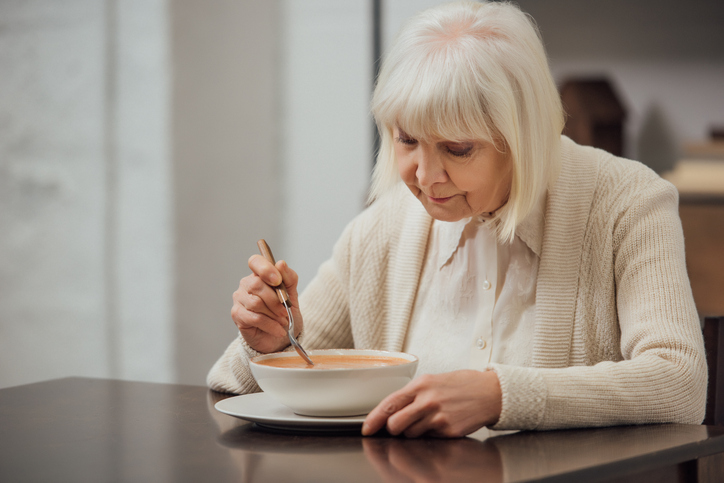
Learn how to manage a decrease in appetite in a senior loved one.
You have just made a huge batch of Mom’s special chili recipe. The house smells yummy, and you cannot wait to eat. However, while you are enjoying not just the taste but the memories the meal invokes, Mom is simply stirring the food around in her own bowl. And it’s not the first time. Recently she has experienced a decrease in appetite, and it’s beginning to concern you.
Why Would an Older Adult Lose Their Desire for Food?
Decrease in appetite is in fact quite common for many older adults, for a variety of reasons, including:
- Difficulty with preparing meals
- A routine that doesn’t include regular mealtimes
- Problems with chewing, swallowing, or self-feeding
- Loss of taste or smell that makes food less appealing
- Loneliness and having no one to share meals with
- Depression and/or grief
- Dehydration
- A sedentary lifestyle
- Feeling as though they’ve lost control over other aspects of life
It is vital to first consult with the person’s doctor and dentist to rule out any medical ailments or medication side effects that may be causing the issue. Once it’s confirmed that there isn’t a clinical reason behind the change in appetite, try these ideas to help restore the person’s joy in eating and help them maintain proper nutrition.
- Offer high-calorie foods in small amounts. As an alternative to three big meals per day, try smaller servings more frequently. You can still prepare larger batches of favorite recipes, splitting them up into individual servings which can be frozen and reheated. Other foods to try that will supply necessary nutrients include whole milk, finely chopped meat or eggs, yogurt, diced fruit, avocado, peanut butter or other nut butters.
- Incorporate softer options. During the summer months when fruit is particularly appetizing, try blending up some healthy smoothies. Summer is also a great time for milkshakes, ice cream, and frozen yogurt. Make it more fun and festive by inviting the family over to make their own custom treats and enjoying them outdoors together.
- Create a schedule. Instead of waiting until the person says they are hungry, designate times each day and stick to a routine for meals. It may take some trial and error to figure out the best schedule, but give the new routine some time to work before fine-tuning. Be sure the person’s routine includes a good amount of physical activity and exercise as well, which helps to enhance appetite.
- Adapt foods and utensils accordingly. If self-feeding is complicated, there is a wide selection of adaptive utensils to explore. You can also make mealtimes easier by serving food that is cut into small, bite-size portions, as well as finger foods like sandwiches, fish sticks, string cheese, chicken tenders, etc.
Live Free Home Health Care’s in-home senior care experts are here to help older adults conquer obstacles to eating healthy. We can prepare nutritious meals and snacks, offer inspiration to stay physically active, and provide friendly companionship during mealtime to make it more fulfilling. Contact us online or at 603-217-0149 to learn more about how we can help a person you love in New Hampton, Epson, Concord and the surrounding communities.
